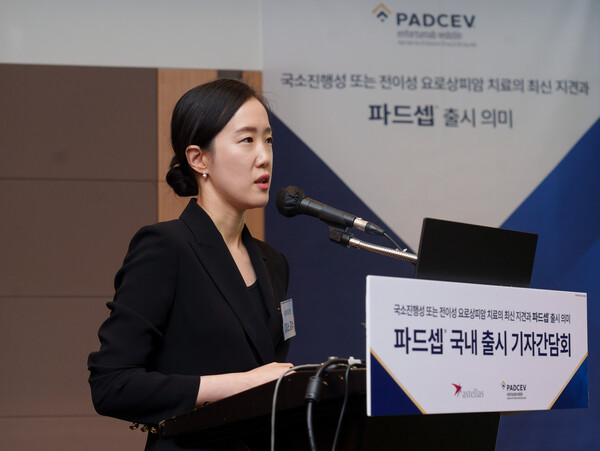Astellas Korea has officially launched Padcev (ingredient: enfortumab vedotin), which treats locally advanced or metastatic urothelial cancer.

Padcev, an antibody-drug conjugate (ADC) that targets Nectin-4, received approval from the Ministry of Drug Safety as a monotherapy in March. It has a category 1 priority recommendation in the National Comprehensive Cancer Network (NCCN) guidelines.
The drug is indicated for patients whose cancer has progressed or recurred after chemotherapy (first-line treatment), and immunotherapies (second-line or first-line maintenance therapy), and no other treatment options are available.
While the drug has yet to receive reimbursement, Astellas Korea announced that it plans to launch a patient support program (PSP) to reduce the financial burden on patients.
"We will launch PSP until Padcev receives reimbursement," said Park Kyung-ah, director of medical affairs at Astellas Pharma Korea said, during a press conference celebrating the launch of Padcev on Wednesday. "The specific scope and method of support are under internal discussion, and we will announce the details of the program through the Korea Blood Disease & Cancer Association once it is finalized."
During the press conference, Professor Kim Mi-so of the Department of Oncology at Seoul National University Hospital explained the burden of urothelial cancer and the significance of the launch of Padcev.
"Urothelial cancer is a type of bladder cancer, and the medical community estimates that 90 percent of bladder cancers are urothelial," she said. "The survival prognosis is reportedly poor."
Kim explains that non-muscle-invasive bladder cancer, which does not affect the bladder muscles, exhibits a promising 80 percent five-year relative survival rate. However, when the cancer invades the bladder muscles, the five-year survival rate dramatically drops to 50 percent.
"Notably, about half of these cases result in distant metastases, and in such cases, the five-year relative survival rate drops even further to 5 percent," Kim said. "Until now, patients were treated with platinum-based chemotherapy as first-line therapy and PD-1 or PD-L1 inhibitors as second-line therapy."
However, first-line platinum-based chemotherapy has been associated with poor tolerability and high rates of disease progression, she added.
Kim also stressed that immunotherapies, which can be considered for second-line treatment, have also been shown to respond in only 13-28 percent of patients, regardless of PD-L1 status.
"This resulted in disease progression, mostly within three months of treatment," she said. "However, in a phase 3 study, which evaluated Padcev to conventional chemotherapy in 608 patients with locally advanced or metastatic urothelial cancer, results showed that Padcev extended the median overall survival (OS) by about 30 percent with the median OS in the Padcev arm being 12.9 months, a 3.97-month extension compared to chemotherapy."
Also, the median progression-free survival (PFS) was also 5.6 months in the Padcev arm and 3.7 months in the control arm, showing a 37 percent reduction in the risk of disease progression, she added.
Kim explained that in the absence of adequate treatment options, she expects Padcev will contribute significantly to improving outcomes for patients with locally advanced or metastatic urothelial cancer.

